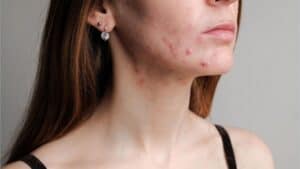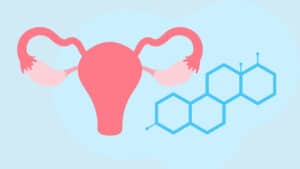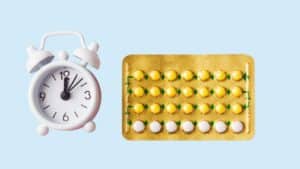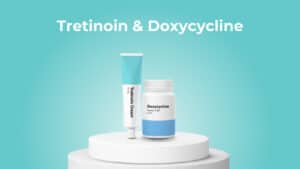Acne affects millions of people worldwide. If you’re looking for acne treatment, it’s important to separate fact from fiction. One thing people often get wrong is thinking that birth control causes acne. But don’t worry, we’re here to set the record straight! In this blog post, we will explore the relationship between birth control and acne, debunk common myths, and provide evidence-based insights to help you make an informed decision. Let’s get started!
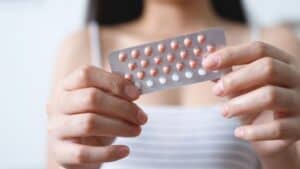
What exactly is acne?
Acne is a common skin condition that affects millions of people worldwide. It happens when hair follicles get clogged with oil, dead skin cells, and bacteria, resulting in pimples, blackheads, whiteheads, and sometimes cysts and pustules.
While acne is often associated with adolescence (teen acne), it can affect people of all ages. The primary cause of acne is hormonal changes, especially during puberty (hormonal acne), pregnancy, and sometimes menopause. These hormonal shifts stimulate the skin’s sebaceous glands to produce excess oil, which can block pores and lead to breakouts. Other factors that can contribute to acne include genetics, certain medications, stress, and an unhealthy diet.
Acne not only has physical effects but also takes a toll on emotional well-being. The visible presence of acne on the face or body can result in self-consciousness, low self-esteem, and social anxiety. Many people with acne may feel embarrassed, ashamed, and even depressed because of the perceived negative impact on their appearance.
Also, acne can also cause physical discomfort. Pimples and cysts can be painful, especially when they become inflamed or infected. The constant itching, tenderness, and irritation associated with acne can be a source of significant discomfort for those with acne.
The emotional and physical impacts of acne can have wide-ranging consequences, affecting various aspects of a person’s life. It can hinder social interactions, relationships, and overall quality of life. Therefore, understanding and addressing the causes and effects of acne are crucial for both treating the condition and helping those who have it.
How does birth control affect acne
Birth control pills, also known as oral contraceptive pills, can have varying effects on acne depending on the individual. While most women (of any age) may experience improvements in their acne while using birth control, a few women may notice an increase in breakouts. This is why it’s important to understand how birth control pills affect acne—this knowledge can help debunk the myth that oral contraceptives cause acne.
So, what happens in your body when you take birth control pills? Read on:
- Decrease androgens: Birth control pills contain synthetic hormones that can help regulate hormone levels in the body. The two main hormones found in most birth control pills are estrogen and progestin. These hormones work together to decrease the production and bioavailability of androgens. Androgens stimulate the production of sebum, an oily substance that can clog pores and contribute to acne formation. By reducing androgen levels, hormonal birth control can decrease sebum production and improve/treat acne.
- Progestin types: The type of progestin in birth control pills, patches, and rings can influence acne. Some progestins increase Sex Hormone Binding Globulin (SHBG), which binds testosterone, which leads to lower androgens circulating in your blood and affecting your skin. These types of progestins are beneficial for individuals with hormonal acne. On the other hand, certain progestins may have androgenic effects, potentially worsening acne for some people.
- Individual response: Don’t forget—everyone’s body reacts differently to birth control. While most women may experience clearer skin, a few may notice an increase in acne. It’s essential to consult with a birth control expert doctor to determine the best birth control option for your specific needs and to address any concerns about birth control and acne.
Birth control can affect acne in various ways. While it may improve acne for most women by reducing androgen levels and sebum production, a few women may experience an increase in breakouts due to the specific progestin used. However, in general, birth control pills, patches, and rings can be a beneficial treatment option for individuals with hormonal acne. These treatments can help regulate hormone levels, reduce sebum production, and provide long-term acne management. Of course, it’s important to remember that each person has an individualized response to birth control, and consulting with an expert birth control doctor is crucial to get the best medication for your acne.
Benefits of Hormonal Birth Control for Acne Treatment
Using birth control pills, patches, or rings for acne treatment can offer several benefits for individuals struggling with acne. Here we summarize some of the key advantages adding hormonal birth control to your acne treatment:
- Maintaining stable hormones: Birth control pills maintain the estrogen/progesterone level in your body at stable levels. Hormonal fluctuations, particularly an excess of androgens (such as testosterone), can contribute to the overproduction of sebum and lead to clogged pores and acne. Birth control pills help maintain stable hormone levels and reduce the severity of acne.
- Decreased sebum production: One of the primary causes of acne is the overproduction of sebum, an oily substance that can clog pores and promote the growth of acne-causing bacteria. Birth control pills can help decrease sebum production by decreasing the production of androgens, which are known to stimulate sebum production. This reduction in sebum can lead to a decrease in acne breakouts.
- Combination therapy: Birth control pills should be used in combination with other acne treatments for enhanced efficacy. Dermatologists often prescribe topical treatments, such as retinoids or benzoyl peroxide, with birth control pills to target multiple aspects of acne formation/worsening. Combination therapy can result in a more effective acne treatment.
- Bonus contraception: In addition to its acne-fighting benefits, birth control pills, patches, rings offer the added advantage of contraception. For individuals who are sexually active and seeking both acne treatment and contraception, birth control pills, patches, and rings can take care of 2 concerns with one treatment (though we always advise a retinoid for acne treatment and back-up protection like a condom to protect against STIs).
It’s important to note that the benefits of using birth control pills, patches, rings for acne treatment can vary from person to person. Most individuals may experience significant improvements in their acne, while a few may see more modest results. When considering birth control pills, patches, rings as additional acne treatment, it is essential to consult with a doctor. She can assess your individual needs, medical history, and acne severity to recommend the most suitable option. She may also suggest other acne treatments with birth control pills, patches, rings for more effective results.
What if My Birth Control is Causing my Acne
If you suspect that your hormonal birth control is causing your acne, it’s important to discuss your concerns with your healthcare provider. They can help determine if your birth control is indeed the cause of your breakout and recommend alternative options. They may suggest switching to a different type of contraceptive pill that contains a different progestin or a lower dose, or a different birth control method, because this can sometimes help alleviate acne.
It’s worth noting that it can take a few months for your body to adjust to a new hormonal birth control method. So, if you’ve recently switched hormonal contraceptives and are experiencing acne, give it some time before deciding if it’s the right choice for you. If your acne persists or worsens after 3 months, consult with your healthcare provider to explore other options.
In the meantime, there are steps you can take to help manage your acne. Establishing a consistent skincare routine that includes gentle cleansing can help keep your skin clear. Additionally, avoiding comedogenic (pore-clogging) skincare products can also make a difference. If your acne does not improve despite these measures, it may be worth considering other acne treatments, such as prescription topical creams or oral medications.
Remember, everyone’s body is unique, and what works for one person may not work for another. By working closely with your doctor, you can find a birth control method that suits your needs while minimizing any potential side effects, including acne.
Other Acne Treatments
There are various types of treatments available to help combat acne, besides birth control pills, patches, and rings. Topical medications are commonly used as the first line of defense. These medications are applied directly to the skin and target the underlying causes of acne such as excess oil production, clogged pores, and bacteria. Some examples of topical medications include benzoyl peroxide, which kills bacteria and reduces inflammation, retinoids that unclog pores and promote cell turnover, and topical antibiotics to reduce acne-causing bacteria.
In certain cases, oral medications may be prescribed for moderate to severe acne or when topical treatments are not effective. Acne oral antibiotics like doxycycline are used to reduce inflammation and kill acne-causing bacteria. Another oral medication, isotretinoin (Accutane), is a potent treatment reserved for severe acne that hasn’t responded to other treatments. It works the same as topical tretinoin (generic Retin A) reducing oil production, preventing clogged pores, and reducing inflammation. However, it is much stronger than topical tretinoin and comes with potential serious side effects, and requires close monitoring by a doctor.
It’s important to consult with a doctor, like one of Pandia Health’s expert physicians, to determine the most suitable treatment option for your specific acne condition. They will consider factors such as the severity of acne, previous treatments, and potential side effects to create an individualized treatment plan. Feel free to reach out to Pandia Health’s expert doctors for guidance and support on your acne journey.
Takeaway
Birth control pills, patches, and rings, because of their androgen lowering properties, have been widely used to treat acne. However, there are myths about the effects of hormonal birth control on acne. We’ve seen that hormonal birth control has more benefits than risk for your skin. If you are not happy with your birth control, you don’t have to suck it up! Talk to your doctor to see if your breakouts can be due to your birth control or you need prescription acne treatment.
At Pandia Health we have expert doctors that can assess your acne online and find the best treatment for your skin needs. We not only offer high quality hormonal expert care but also FREE delivery of your medication. No need to wait to be seen in a doctor’s office, simply sign up for an online consultation, fill out a health history form and wait to hear back from the doctor once your profile has been reviewed. Easy and convenient. What are you waiting for? Say bye to acne today with Pandia Health!
Disclaimer: This article is for general informational purposes and is NOT a substitute for professional medical advice. Always seek the advice of your healthcare provider before starting or changing birth control.


